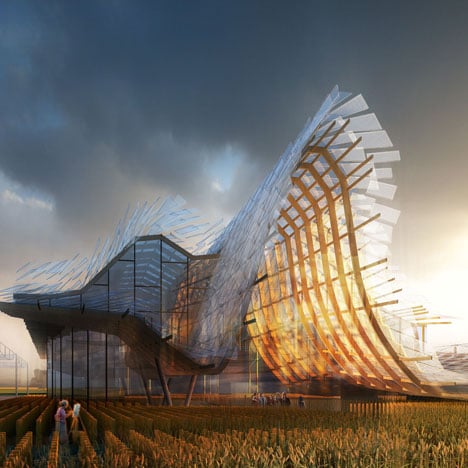Milan Expo 2015: New York firm Studio Link-Arc and a team from Tsinghua University have revealed their competition-winning design for a pavilion with an undulating roof to represent China at the World Expo 2015 in Milan.
Studio Link-Arc, which is led by Chinese architects Yichen Lu and Qinwen Cai, and Virginia native Kenneth Namkung, collaborated with researchers from Tsinghua University to develop its vision for "a cloud hovering over a land of hope". This includes a field of crops and a wave-like roof overhead.
The designers plan to use large bamboo panels to create a series of shingles across the roof, reminiscent of the terracotta tiles used in traditional Chinese constructions. These will be fixed onto arching wooden frames, giving the building its distinctive profile.
"The pavilion's floating roof is designed as a timber structure that references the 'raised-beam' system found in traditional Chinese architecture, but is adapted to accommodate modern construction technology," said the architects.
Beneath the roof, a field of wheat designed to reference China's agrarian past will merge into a interactive installation where LED lights are hooked up to electronic stalks.
This will lead to a series of exhibitions and cultural programs dotted around a sheltered plaza. A staircase will allow visitors to access rooftop viewing platforms, offering aerial views of both the field and the pavilion's surroundings.
"The pavilion's full exhibition and cultural offerings are experienced as a sequence of spaces, beginning with an exterior waiting area in the landscape, leading to a themed exhibition space with interactive installations and cultural offerings from 40 Chinese provinces," explained the designers.
China is one of 145 nations participating in the Milan 2015 expo, which takes place from May to October. Other proposals unveiled so far include a pavilion with a field and tractors on its roof, for agricultural company New Holland.
Here's a project description from the design team:
China Pavilion, Expo Milano 2015
Tsinghua University, along with New York-based Studio Link-Arc, has been announced as the winner of a competition to design the China Pavilion at the 2015 Milan Expo. Rejecting the typical notion of a pavilion as an object in a plaza, the China Pavilion is instead conceived as a field of spaces. Designed as a cloud hovering over a "land of hope", the pavilion is experienced as a sheltered public plaza beneath a floating roof that incorporates the building's cultural and exhibition programs. The roof's distinctive profile creates an iconic image for the project and will foster a unique presence within the Expo grounds.
The China Pavilion is themed "The Land of Hope". The project embodies this theme through an undulating roof form, which is derived by merging the profile of a city skyline on the building's north side with the profile of a landscape on the southern side, expressing the idea that "hope" can be realised when nature and the city exist in harmony. The pavilion's floating roof is designed as a timber structure that references the "raised-beam" system found in traditional Chinese architecture, but is adapted to accommodate modern construction technology. The roof is clad in shingled panels that reference traditional Chinese terracotta roof construction, but are reinterpreted as large bamboo panels that reduce structural weight, create a shaded public space below, and further enhance the Pavilion's unique silhouette.
Beneath this roof, the building's ground plane is defined by a landscape of wheat (the "field of hope") that references China's agrarian past and transitions seamlessly into a multimedia installation in the centre. This installation, formed from a matrix of LED "stalks" that mimic the form of the wheat, forms the centrepiece of the building's exhibition program.
The Pavilion's full exhibition and cultural offerings are experienced as a sequence of spaces, beginning with an exterior waiting area in the landscape, leading to a themed exhibition space with interactive installations and cultural offerings from forty Chinese provinces. After this, visitors are guided up a gently sloped public stair to a panoramic viewing platform above the LED matrix installation, after which they are guided into a multimedia space, which will feature a short film focused on returning home for the Spring Festival. This sequence concludes with visitors stepping outside onto a platform above the bamboo roof that enjoys expansive views of the Expo grounds.
Project Name: China Pavilion for Expo Milano 2015
Award: First Prize
Client: China Council for the Promotion of International Trade
Organizer: Expo Milano 2015
Architecture:
Architect: Tsinghua University & Studio Link-Arc
Chief Architect: Yichen Lu (Tsinghua University + Studio Link-Arc)
Associate In Charge: Kenneth Namkung, Qinwen Cai (Studio Link-Arc)
Project Team: Shuning Fan, Hyunjoo Lee, Dongyul Kim, Alban Denic , Zach Grzybowski (Studio Link-Arc)
Structural Engineer: Simpson Gumpertz & Heger
Enclosure Engineer: Elite Facade Consultants + ATLV
MEP Engineer: Beijing Qingshang Environmental Art & Architectural Design
Exhibition, Landscape and Interior Design
Design Director: Dan Su, Yue Zhang (Academy of Arts and Design, Tsinghua University)
Chief Designer: Yi Du (Academy of Arts and Design, Tsinghua University)
Exhibition Design: Yanyang Zhou, Danqing Shi (Academy of Arts and Design, Tsinghua University)
Landscape Design: Xiaosheng Cui (Academy of Arts and Design, Tsinghua University)
Interior Design: Jiansong Wang (Academy of Arts and Design, Tsinghua University)
Installation Design: Danqing Shi, Feng Xian (Academy of Arts and Design, Tsinghua University)
Light Design: Yi Du (Academy of Arts and Design, Tsinghua University)
Visual Identity Design: Xin Gu (Academy of Arts and Design, Tsinghua University)

